The Integral Role of Industrial Switch Manufacturers in Modern Automation
In the rapidly evolving landscape of industrial automation, the importance of robust and reliable networking infrastructure cannot be overstated. Among the critical components that enable seamless communication within industrial environments are industrial switches. These devices form the backbone of data transmission across various automated systems, ensuring uninterrupted and efficient operations. Consequently, industrial switch manufacturers play a pivotal role in developing and supplying these essential components, catering to the diverse needs of industries worldwide.
Understanding Industrial Switches
Industrial switches are specialized devices designed to connect multiple devices within an industrial network, allowing for the efficient transfer of data. Unlike their commercial counterparts, industrial switches are built to withstand harsh environments characterized by extreme temperatures, vibrations, and electrical noise. They facilitate the communication between programmable logic controllers (PLCs), human-machine interfaces (HMIs), sensors, and other critical equipment, forming an integral part of the Industrial Internet of Things (IIoT).
Key Features of Industrial Switches
- Durability and Reliability: Industrial switches are engineered to endure challenging conditions. They are typically housed in rugged enclosures that offer protection against dust, moisture, and mechanical impacts. This durability ensures consistent performance and minimizes downtime in industrial operations.
- Wide Temperature Range: These switches are capable of operating within a broad temperature spectrum, often ranging from -40°C to 75°C or more. This feature is crucial for applications in environments where temperature fluctuations are common.
- Redundancy and Failover Capabilities: To enhance network reliability, industrial switches often incorporate redundancy and failover mechanisms. These include features such as ring topology support, which allows for automatic rerouting of data in the event of a network failure, ensuring continuous operation.
- Enhanced Security: Industrial networks are increasingly becoming targets for cyber-attacks. To mitigate these risks, industrial switches come equipped with advanced security features such as access control lists (ACLs), port security, and network segmentation capabilities.
- Power over Ethernet (PoE): Many industrial switches support PoE, allowing them to supply power to connected devices like IP cameras and wireless access points through the Ethernet cables, simplifying installation and reducing wiring costs.
Leading Industrial Switch Manufacturers
The market for industrial switches is populated by several key players, each contributing to the advancement of industrial networking technology. Some of the leading industrial switch manufacturers include:
- Siemens AG: Renowned for its innovative solutions, Siemens offers a comprehensive range of industrial switches designed for various applications. Their products are known for their reliability and advanced features, catering to industries such as manufacturing, transportation, and energy.
- Cisco Systems, Inc.: A global leader in networking technology, Cisco provides industrial switches that combine robust performance with cutting-edge security features. Their switches are widely used in critical infrastructure and industrial automation projects.
- Belden Inc.: Belden specializes in industrial networking solutions, offering a wide array of switches that are designed to meet the stringent requirements of industrial environments. Their products are favored for their high reliability and ease of integration.
- Moxa Inc.: Moxa is a prominent name in the industrial networking domain, known for its rugged and reliable switches. Their extensive product line supports various industrial protocols and offers solutions for both small-scale and large-scale industrial networks.
The Future of Industrial Switches
As industries continue to embrace automation and the IIoT, the demand for advanced industrial switches is expected to rise. Future developments in this field are likely to focus on enhancing data throughput, improving cybersecurity measures, and integrating more intelligent features such as real-time analytics and machine learning capabilities. Industrial switch manufacturers will need to innovate continuously to address the evolving needs of industrial automation and maintain their competitive edge.
Conclusion
Industrial switch manufacturers are at the forefront of enabling efficient and reliable communication within industrial networks. Their products are fundamental to the operation of automated systems across various industries, providing the necessary infrastructure for data transmission in challenging environments. As the landscape of industrial automation continues to evolve, these manufacturers will play an increasingly critical role in shaping the future of industrial networking technology. Through innovation and adherence to high standards of quality and reliability, industrial switch manufacturers ensure that industries can operate seamlessly and securely in an interconnected world.
